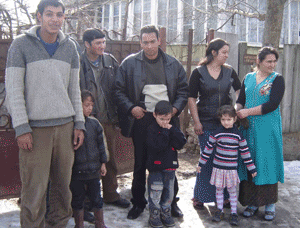 Gela Mtivlishvili, Kakheti
Gela Mtivlishvili, Kakheti
Georgian has ratified several international documents and has officially assumed responsibility to protect ethnic minorities wit in its territory, including among other groups is a Roma population. However, the state has not worked out any politician direction to actually protect the security of the Roma and to create a tolerant environment for them within Georgia. They are still arbitrarily arrested, they are still made into virtual slaves, and they continue to under the most unbearable of conditions. Most Roma children are blocked from access to education and from being able to receive adequate medical assistance.
According to the State Statistics Department, based on the data of the 2002 census, nearly 2000 Roma live in Georgia. However, it is expected that their number is actually higher that what is officially reported. According to the Registration Institution of the Civil Acts within the Ministry of Justice, Roma women mostly give birth to their children at homes and without any doctor’s assistance. Thus, children are not registered and they do not receive any legal civil status as a result.
Lawyers say Roma children do not receive Georgian citizenship immediately after the birth. They do not have right to take part in the elections because they do not have IDs. Roma community cannot be involved state programs and cross international borders for the same reason, as they are technically stateless persons without documents.
Roma live in almost every region of Georgia; in Kakheti region too. Nearly 40 families settled in the village of Leninovka in Dedoplistskaro District several dozen years ago. OPnly 10 families continue to live there for now.
Twenty-four-year-old Mikhail Denisenko said in his interview with us most of his relatives resettled to Tbilisi because of poor social conditions.
“All of us are unemployed and we are very poor. Previously we worked would take some day jobs for private persons, doing physically work. Often this proved to be slave like as we did not always get paid. Thus, we gave up the job. We are eager to work, there were vacancies at private enterprises but they will not employ us. Our relatives resettled to Tbilisi to escape the dire poverty in the village. Now they earn their living by trade activity.
-Poverty Reduction Program being implemented in Georgia. As far as I know, all family members have IDs. Are you involved in the program?
-No, none of Roma residents of the village are involved in the program and we have even managed to put all our documents in order. Last year we applied to the Social Aid Agency and we asked to explain how we could become involve their program too. However, in spite of all our efforts, they did not pay any attention to us. Many of Roma people do not have information about the program. The situation is made difficult as they do not speak Georgian. None of us can even read or write in the Russian language.
-Don’t your children go to school?
-Which school? Georgian-Russian School in Dedoplistskaro is too far from us. It is impossible for our children to walk so far to get to school. There was primary school in the village back during the time of the communists and the Soviet Union but then it now ruined and nobody now ever remembers us.
-If there is a school, would you send your children to school?
- We will send our children to school by all means if there was a school to send them to. We as adults would also attend school if we were given an opportunity to go to school.
-Do you have problems with law enforcers?
-Policemen harass us for everything, if they notice us in the town and on that day something is lost, the police officers will blame directly us stealing and threaten with detention unless we pay for whatever is said to have been lost or stolen. Several days ago, my cousin Lonia Shabanov was blackmailed by Valeri Lekashvili, police investigator, to sign an empty sheet of paper. If he had not signed the paper, he threatened to arrest him. After the incident Lonia has left for Tbilisi and he never arrives here because he is afraid of being arrested for something,” said Mikhail Denisenko.
Georgian Public Defender stated that Roma problem is one of the most pressing problems in the international community in the field of human rights protection. “In 1999 Georgia ratified European Convention of Human Rights and Basic Freedoms. Also, in April of 1999 Georgia became member of the Council of Europe and assumed responsibilities to protect ethnic minorities and Roma are among them. On October 13 2005 Georgian Parliament ratified the Draft Convention on Ethnic Minorities though the state has not prepared special politics for the protection of ethnic minorities and exercise its responsibilities,” said Sozar Subari, the Public Defender.
He added that social isolation, extreme poverty, high level of unemployment, illiteracy and other related problems prevent Roma people to integrate into larger society.
“The government should study the problems of the Roma in a way that will support the development of their ethnic minority and integration. I think both governmental and non-governmental monitoring groups must be set up and work towards protecting the Roma.
Moreover, it is important that Roma are also able to participate in all on-going activities that will be connected with their community. The state should support Roma in being able to access education and to provide them with social assistance,” said the Georgian Ombudsman.



